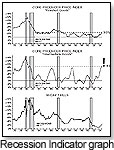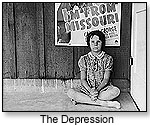
April 2, 2025

November 2008 | Vol. VII - No. 11
Hollywood ToyBoy: No Downturn for Toys
Toys and Entertainment Look Up in Economic Crisis
| “Advertise the smaller-ticket items and make up in quantity what’s lost in big-ticket items.” |
“I don’t care if the economy’s in the crapper!” I screamed into my phone, my no-news-is-good-news accountant to the stars (and me) on the other end of the line, “I want to buy entertainment stocks galore. And I’m gonna do it!”
 With that, I hung up. Doesn’t he know the Golden Rule? In times of economic woe, America likes to be entertained. Seven-hundred-billion-dollar bailouts, stocks dropping like brick balloons, cutbacks, skyrocketing prices. So what?
With that, I hung up. Doesn’t he know the Golden Rule? In times of economic woe, America likes to be entertained. Seven-hundred-billion-dollar bailouts, stocks dropping like brick balloons, cutbacks, skyrocketing prices. So what?
TRADING TROUBLES FOR ENTERTAINMENT
“Historically,” a raven-haired, dressed to-the-nines entertainment lawyer buddy explained, “people like to forget their troubles. Housing always gets hit hard, whether in the ‘30s Depression or the early ‘80s and early ‘90s recessions, but movies, sports and kids’ merch take an upturn. Happens every time.”
Truly? I remember hearing stories from my grandparents about dime movies during the Great Depression, but now tickets are $10 a shot and more. People still go? A UCLA economics professor who was trying to get me to read a script he’d written added to the fray: “Despite television, cable, HD, more people are going to stadiums and theaters to get their minds off their predicaments than ever before. It’s part social, part escapism.”
 And kids? “Everyone wants the best for their children,” related a director friend who’s made more money off the stock market than from Hollywood.
And kids? “Everyone wants the best for their children,” related a director friend who’s made more money off the stock market than from Hollywood.
“So even when times are tough, their first thought is roof, food, then kids. Toys are always bought for Christmas. It’s the last thing a parent cuts back on. That’s why it’s a good economic indicator to keep an eye on when the rest of the world is going to Helsinki in a hand basket. Look at how many toy companies were either founded or reached ramming speed during the ‘30s.”
RETHINK STOCK TO STAY SOLID
But isn’t it harder to keep a store floating when all others around are sinking?
 “It’s a matter of trust between storeowner and customers. When the economy is down, it’s a time to project an image of equanimity and solidarity. Advertise the smaller-ticket items and make up in quantity what’s lost in big-ticket items. In the early ‘80s, many toy companies actually increased the number of toy lines in order to increase their niche potential and spread their cost-per-item R&D budgets. Same can happen to ma-and-pa stores.”
“It’s a matter of trust between storeowner and customers. When the economy is down, it’s a time to project an image of equanimity and solidarity. Advertise the smaller-ticket items and make up in quantity what’s lost in big-ticket items. In the early ‘80s, many toy companies actually increased the number of toy lines in order to increase their niche potential and spread their cost-per-item R&D budgets. Same can happen to ma-and-pa stores.”
A studio VP was nibbling on caviar, despite our talk about economic troubles: “Studios have always established stronger ties to merchandising during times of tightened purse strings. My prediction: more toys based on movies, more television shows based on toys. Kids think hard times are about their parents, so it’s easier to sell must-have social cues: things that are tied to the latest episode/movie idea that kids talk about at school.”
And so where does it leave toymakers and toy sellers? The studio VP smiled: “It’s never a bad time for entertainment. When the universe comes to an end, someone will be there selling tickets to the movie and toys to the kids.”
Copyright © 2025 TDmonthly®, a division of TOYDIRECTORY.com®,
Inc.



 With that, I hung up. Doesn’t he know the Golden Rule? In times of economic woe, America likes to be entertained. Seven-hundred-billion-dollar bailouts, stocks dropping like brick balloons, cutbacks, skyrocketing prices. So what?
With that, I hung up. Doesn’t he know the Golden Rule? In times of economic woe, America likes to be entertained. Seven-hundred-billion-dollar bailouts, stocks dropping like brick balloons, cutbacks, skyrocketing prices. So what?  And kids? “Everyone wants the best for their children,” related a director friend who’s made more money off the stock market than from Hollywood.
And kids? “Everyone wants the best for their children,” related a director friend who’s made more money off the stock market than from Hollywood.  “It’s a matter of trust between storeowner and customers. When the economy is down, it’s a time to project an image of equanimity and solidarity. Advertise the smaller-ticket items and make up in quantity what’s lost in big-ticket items. In the early ‘80s, many toy companies actually increased the number of toy lines in order to increase their niche potential and spread their cost-per-item R&D budgets. Same can happen to ma-and-pa stores.”
“It’s a matter of trust between storeowner and customers. When the economy is down, it’s a time to project an image of equanimity and solidarity. Advertise the smaller-ticket items and make up in quantity what’s lost in big-ticket items. In the early ‘80s, many toy companies actually increased the number of toy lines in order to increase their niche potential and spread their cost-per-item R&D budgets. Same can happen to ma-and-pa stores.”